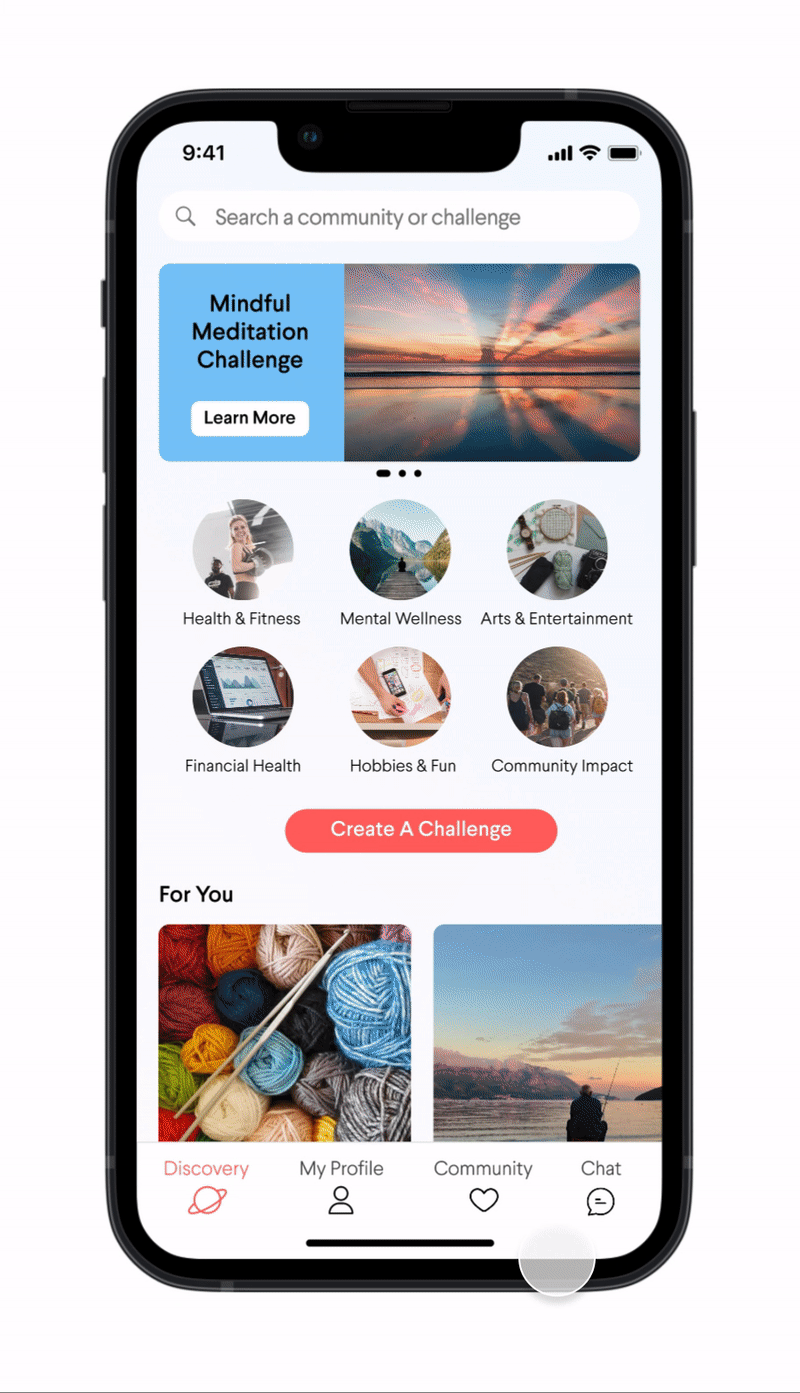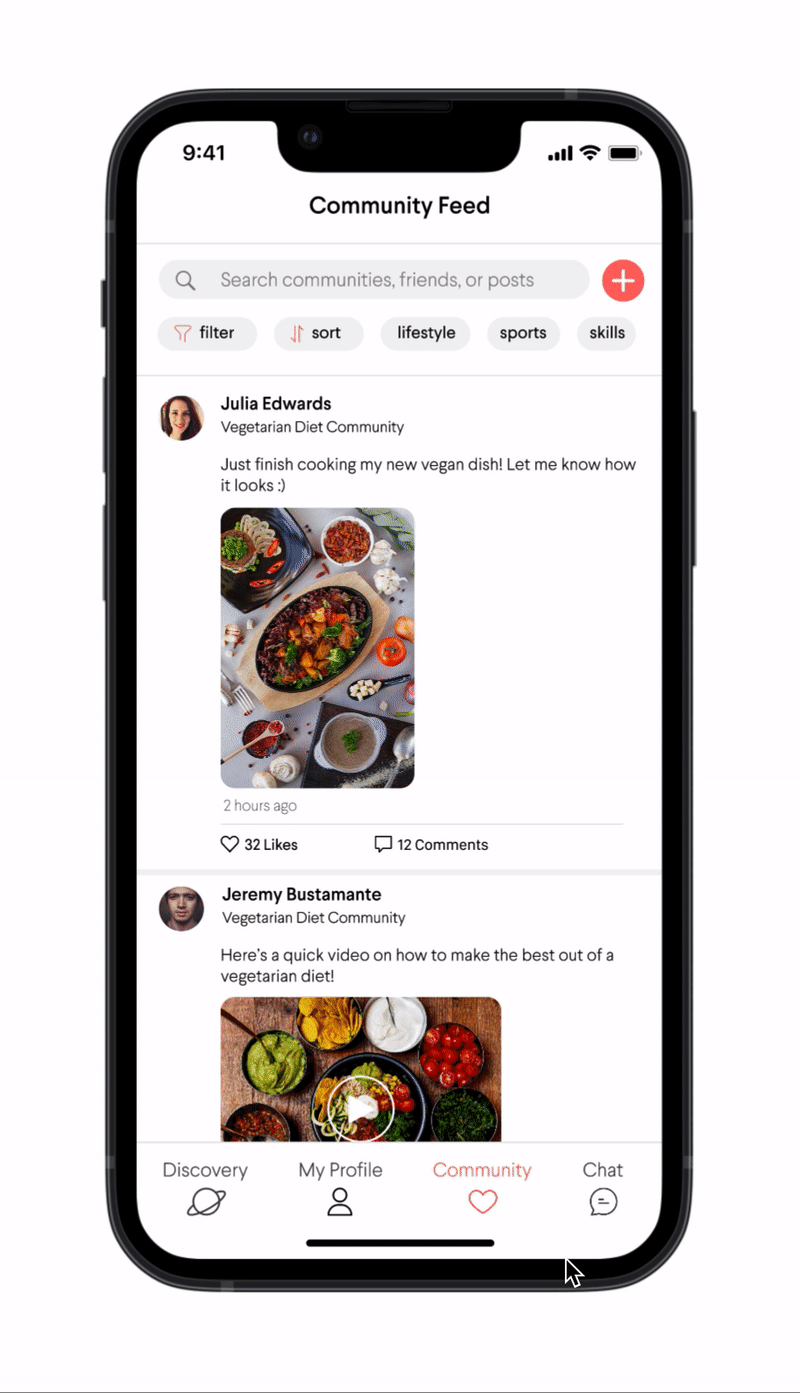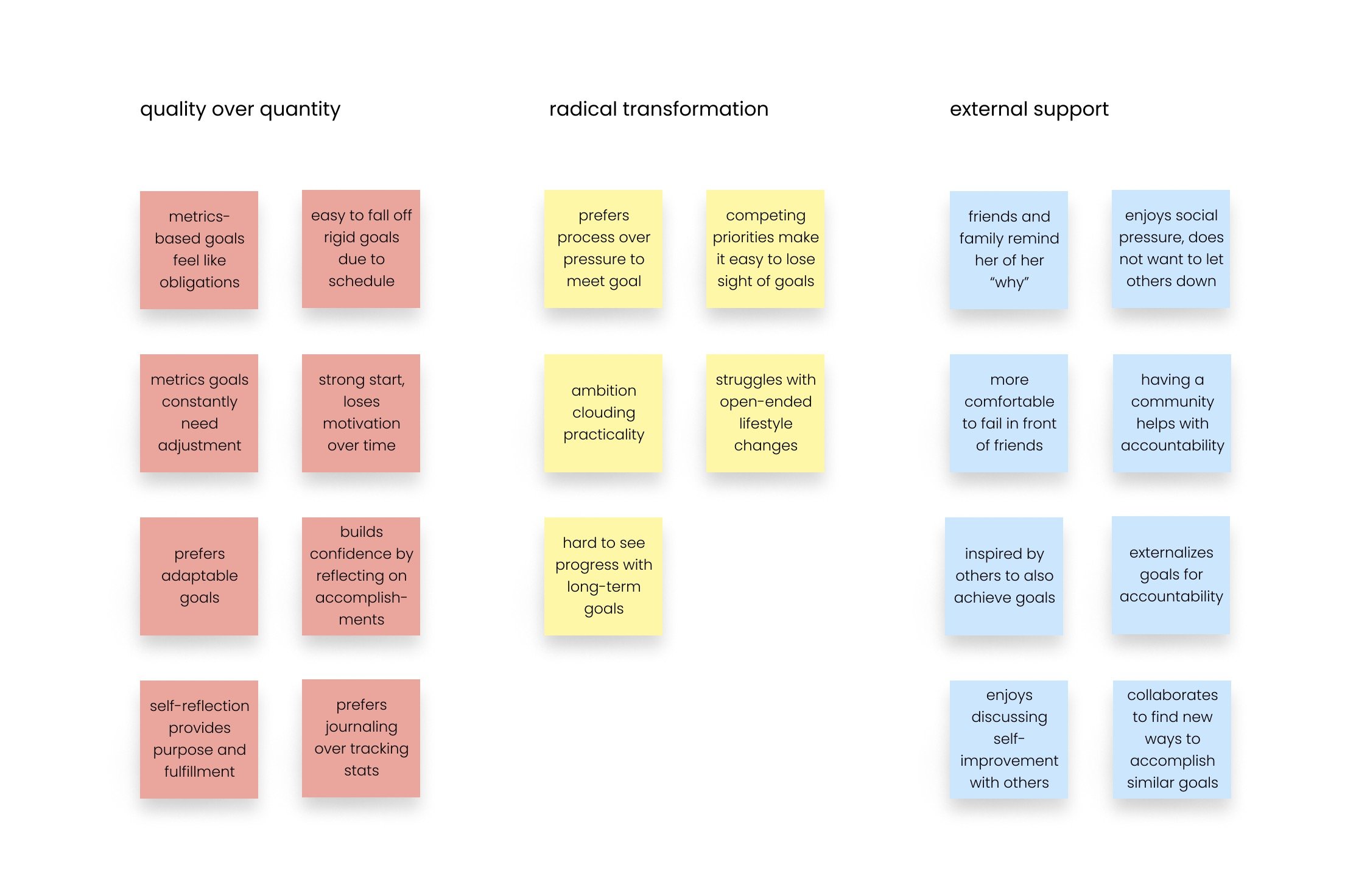TRYBE
timeline: 1 month (november - december 2021)design team: victor chue, yifan cui, anita trimburproject overview
Trybe empowers personal growth through camaraderie and community. We designed a mobile app for users to create and join group challenges within various growth-oriented categories such as mental wellness, health & fitness, community impact, and more.
This project was created in partnership with Tameem Rahal as our client.

my role
ux designer and project manager
• created agile, 4-week plan for end-to-end project
• led weekly client and internal meetings as the primary liaison between client and design team
• spearheaded user research including survey and interviews
• ideated and designed low, mid, and high-fidelity prototypes
• facilitated usability testing and identified key areas for improvement
why is personal growth important?
health, career growth, community impact
Personal development is essential at both the individual and community scale. On the individual scale, those who are motivated to grow are more likely to lead healthier and happier lifestyles and invest in their professional development. On the community scale, these individuals are more likely to possess a strong sense of purpose and maximize their potential to contribute on a broader, societal level.
the problem
obstacle to growth: loss of motivation
After surveying 20 users about their experiences with personal-development , 47% of respondents cited loss of motivation as the main obstacle to growth.
why are users losing motivation?
We conducted five in-depth interviews to find out why users are losing motivation when setting goals. The main catalysts include:
01 difficulty achieving metric-based goals due to lack of time and competing priorities
02 pressure to achieve radical transformation overshadowing signs of progress
03 lack of external support for inspiration and accountability
the solution
personal journey, shared growth
let’s motivate each other!
Trybe is a mobile application for users to create and join group challenges within various growth-oriented categories such as mental wellness, health & fitness, community impact, and more.
Instead of putting pressure on stifling metrics and radical transformation, Trybe focuses on the qualitative journey of self-development by encouraging users to celebrate progress through reflecting on the process. Furthermore, Trybe provides the space to authentically share the growth experience with like-minded friends for support, accountability, and inspiration.
key features
01 join or create group challenges
Join or create your own custom challenge. Define your goals, set a timeline, and invite your friends to embark on the challenge alongside you.
02 journal your progress and share
Journal your progress-- the good, the bad, and the ugly. Share your text, photo, and/or video posts with friends.
03 support your friends by interacting with their progress
Check-up on your friends’ progress in the community feed for social motivation. Leave likes and comments for encouragement and support.
how did i arrive at this solution?
read about my process below!
research methods
user interviews
secondary research
competitive analysis
01 user interviews
understanding the journey of personal growth
After surveying 20 users interested in personal development about their experiences , 47% of respondents cited loss of motivation as the main obstacle to growth.
In order to dig deeper into why users are losing motivation, we conducted five detailed interviews. These key questions guided our conversations:
• what prevents you from achieving your goals?
• what motivates you to achieve your goals?
• how do you reflect on progress?
• how do you define success?affinity diagram
We discovered valuable insights about obstacles and motivations, the reflection process, and definitions of success in relation to personal-growth. When arranging the insights by affinities, some key themes emerged:
key interview insights
users are losing motivation with personal growth because:
01 difficulty achieving metrics-based goals with busy schedules and competing priorities. Users prefer a qualitative over quantitative approach to personal-growth.
02 pressure to achieve radical transformation. It’s difficult to see signs of progress when users erroneously focus on the end goal only and not the process and smaller wins.
03 lack of external support. Close friends and family provide inspiration and accountability.
02 secondary research
“It’s much easier to sustain commitment to hard personal change with the active participation of others”
understanding the impact of community on personal growth
Stanford psychology professors, Geoffrey Cohen and David Sherman conducted extensive research to validate the hypothesis that self improvement is most successful as a community effort.
In their self-affirmation theory, they suggest that sustaining commitment to personal growth is facilitated by the involvement of community. Their reasons include:
• mutual reinforcement is a powerful tool for garnering motivation
• exchange of empathy and advice accelerates adoption of behavior change
• accountability increases chances of commitment key secondary research insights
community is essential to personal growth because:
01 mutual reinforcement creates a shared momentum that propels motivation.
02 exchange of empathy and advice within a support system accelerates the adoption of behavior change.
03 having accountability will increase the chances of committing to ones goals.
competitive analysis
identify strengths and weaknesses of competitors
We conducted a competitive analysis of three products with similar goals of motivating self-improvement, including Strava, 21-Day Challenge, and Habitus.
01 Strava
why Strava?an industry-leader in the fitness tracking industry, also includes social network features
strengths• recommends challenges to users based on activity
• custom challenges
weaknesses• don’t understand Active tab in Groups
• most group features locked as premium feature
02 21-Day Challenge
why 21-Day Challenge?unique focus on challenge creation rather than habit tracking
strengths• community feed boosts engagement
• encouraging, positive brand voice
weaknesses• user not given much control over customization of challenges, restricted to 21 day timeline
• UI weak contrast between background and text, is inaccessible
03 Habitus
why Habitus?example of typical habit-tracking app
strengths• categorization of challenges
• reminders
weaknesses• data-entry/tracking heavy, increases time on task and may cause abandonment and/or discouragement
• cold, analytical experience
key competitive analysis insights
Knowing that users value a qualitative approach to self-improvement as well as external support from friends, the following insights will guide design ideation:
01 customize experience by recommending challenges based on activity
02 adopt encouraging, social-proof focus of challenge creation products
03 avoid data-heavy, analytical experience of habit tracking products
defining the problem
Synthesizing all three research methods, user interviews, secondary research, and competitive analysis, we identified three key insights to explain why users are losing motivation with personal growth.
01 users struggle with achieving rigid, metric-based goals
evidence
user interviews:“When I made metric-based goals, they felt more like obligations and I usually had to adjust them.”
competitive analysis:• avoid habit-tracking, quantitative approach
• emulate challenge-setting, qualitative approach
02 focusing solely on radical transformation overshadows progress
evidence
user interviews:“I struggle to see progress with open-ended, lifestyle changes.”
competitive analysis:• a feed allows users to share progress so that they are reflecting on the process along the way
03 external support systems strengthen motivation
evidence
user interviews:”Externalizing goals and progress with someone I trust helps me with accountability and inspiration.”
secondary research:• community is essential for personal growth because mutual reinforcement, exchange of empathy, and accountability strengthen motivation
ideating the solution
In order to ideate solutions, we generated answers to the ‘how might we’ questions as a group brainstorm exercise.
01 encourage a qualitative approach
• journal entries
• attach relevant media (photo, video)
• timeline of activity
02 redirect focus on the process
• journal prompts
• reminder notifications
• motivational quotes
• designate milestones
03 incorporate a community approach
• group challenges
• social media feed
• chat
user flows
The three key flows users will take within the mobile application are challenge creation, challenge tracking, and community engagement.
The challenge flows will incorporate features that facilitate a qualitative and process focus on self-growth such as defining milestones and journaling. The community engagement flow will incorporate collaborative features such as a social media feed.
01 challenge creation
• create custom challenges
• define goals and timing
• invite friends to join
02 challenge tracking
• log and journal your progress
• share your progress with friends
03 community engagement
• visit social media feed to see friends’ progress
• interact with posts
• visit explore page to join public challenges
sketches
We started by sketching options for screen layouts of key flows: challenge creation, challenge tracking, and community engagement.
mid-fidelity prototypes
We proceeded to up the fidelity so that we could have a comprehensive prototype to test on users.
usability testing
goals
We conducted usability testing with five users interested in personal growth by observing them complete tasks in a clickable prototype.
The goal was to identify usability issues with the three key flows: challenge creation, challenge tracking, and community engagement.
findings
We asked the users to rate how easy or difficult it was to accomplish each of the three tasks on a scale from 1 to 5 to add quantitative findings to support our qualitative observations.
issue 01: users struggled with sharing progress
observation• 4 out of 5 users navigated to the ‘My Profile’ tab to create a status update instead of the ‘Community’ tab
• once on the correct tab, they struggled to find the icon to create a post
solution• allow users to post from either the ‘My Profile’ or ‘Community’ tabs
• give post icon more visual hierarchy with a text box and suggestion text or brand-colored plus button
issue 02: users struggled to find friends’ posts
observation• 2 out of 5 users struggled to find their friends’ posts
• users prefer to have a searchable friends list vs. checking up on their friends in the community feed
solution• add friends list to ‘My Profile’ tab
• add ability to search friends in the community feed
issue 03: users did not know who their posts would be shared with
observation• 2 out of 5 users were hesitant to share progress as it was unclear who their post would be visible to
solution• add a privacy dropdown to allow users control over visibility of their posts
creating a brand identity
goals
Because Trybe is a new startup, there were no pre-existing branding assets. Our team developed brand attributes and a mini design system to visually convey Trybe’s mission to empower personal growth through camaraderie and community.
brand attributes
supportive
fun
curious
inspiring
mini design system
final designs
Aggregating the feedback from usability testing and established brand identity, we created wireframes and a high-fidelity prototype for each of the three key flows.
01 join or create group challenges
Join or create your own custom challenge. Define your goals, set a timeline, and invite your friends to embark on the challenge alongside you.
02 journal your progress and share
Journal your progress-- the good, the bad, and the ugly. Share your text, photo, and/or video posts with friends.
03 support your friends by interacting with their progress
Check-up on your friends’ progress in the community feed for social motivation. Leave likes and comments for encouragement and support.
reflection
lessons learned
communicate the importance of UX researchWe started the project with a client-provided hypothesis that a community approach to personal growth would spark motivation. In our kickoff meeting, we emphasized the importance of conducting UX research to validate this hypothesis, ensuring that we have user-supported evidence to add value to Trybe’s mission.
work under an agile timelineWe had four weeks to complete this end-to-end design project. Not only did we learn to work at maximum efficiency, but we also learned to prioritize frequent communication to ensure we are incorporating stakeholder input and approval.
measuring results
does a community approach to personal growth actually help?We would like to find out if Trybe successfully increases motivation with its community approach to personal growth, ultimately helping users achieve their goals.
To test this, we would have two groups embark on the same challenge on Trybe. One group invites friends and the other does the challenge individually.
While we would record quantitative data about the success rate of both groups, we learned from user research that success with personal growth does not necessarily mean meeting a metric. We would compliment the quantitative data with qualitative data and analyze the journal entries from both groups. Does the group taking on the challenge with friends have a more positive, motivating experience and are inspired to adopt healthy habits long term?
future plans
usability testing of high-fidelity prototypeMoving forward, we would like to conduct an additional round of usability testing of high-fidelity prototypes to ensure we developed the right solutions for pain points that users experienced while testing the mid-fidelity prototypes.
potential revenue streamAs discussed with our client, the initial iteration of the Trybe app will be free to the public in order to establish a healthy user base. Once the product has gained popularity, we would like to evolve the app to include paid premium features such as the ability to utilize coaches that are experts in the field. The goal is that the coaches will add social motivation through a unique, educational experience.























